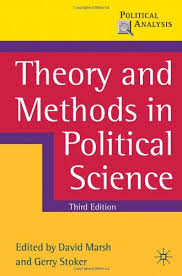As part of continued efforts in understanding research methods and not only choosing the correct one for any dissertation but understanding how to do said method well I have looked at:
Theories and Methods in Political Science edited by David Marsh (1995) Macmillan: Basingstoke.
This book helpfully breaks down the sections into methods and includes a good quotable introduction. It reminds us that ‘’in the study of political science it is important to be aware of the methodological choices available’’ page 13-14 because certain methods may be useful in certain research questions. The way of selecting seems rather unscientific when Stoker suggests certain topics have ‘gut’ preferences for certain methodological approaches page 14. It leads me to believe that in order to answer any research question it needs to be tacked from every research method and I am one part of this process.
For me it has identified the umbrella term inductive method ‘’The inductive method [which] draws its conclusions by empirical observation and the search for patterns and generalisations.’’ This is what comparative analysis comes under.
Due to the fact that ‘’The comparative method involves the PRESENTATION of empirical evidence of some kind in an attempt to compare systematically and explicitly political phenomenon.’’ Page 173 I need to present evidence for both cases from the same variable (provided you do two cases)
I am going to be reviewing two terrorist groups which is sanctioned under Marsh et al opinions of good comparative analysis as ‘logically, the comparative method can be employed in intra country comparisons’’ so logically, elements from within the state such as terrorist groups can be compared to other similar groups in other states. Page 173
Although there is not hierarchical line of methodology, some are needed to be done first, data and evidence cannot be used to test a concept unless the theory is first developed properly. Page 175 With this in mind my dissertation will need to clarify some conceptual ideas first such as what is security. This means I will have to use some conceptual methodology (only a little bit) to set my concepts.
There are 3 different types of comparative anayisis 1) case studies of individual states within a framework 2) comparing a limited number of states 3) global comparison of statistics.
INDIVIDUAL case studies have been accused of not being comparative method but may have comparative merit!! Page 177. Marsh calls this ‘pedatitic’ but I agree. A single case study can be put together with another with similar variables that it looks at and conclusions drawn to create an analysis. This is what comparative merit means. It is not an insult just highlighting how it can be used in the future. Something every researcher would want. It could be used as part of a edited book into cases of terrorist groups or whatever.
I will be looking into two cases. Selecting the amount of cases have implications in relation to the detail you can do. If you are aiming for generalizability then more is better than less. It is a trade off. Page 189
Stoker warns us that globalisation has implications for comparative case study analysis. But this can be a benefit as my aim is to provide relevant recommendations to defence companies/MOD and defence and security related think tanks such as Jane’s on how to deal with a globalising and dynamic terror group.
This means ‘’we must study the way in which individual states (in my case terrorist groups) contribute to the processes of globalisation’’ i.e what effects do these groups have on the West page 189 and that ‘’Globalisation means researchers need to broaden their concerns in order to understand more the common global problems that all countries face.’’ This is inevitable anyway as ‘’Gone are the days when political scientists could insulate the study of politics from the broader social and economic processes’’ All page 186.

